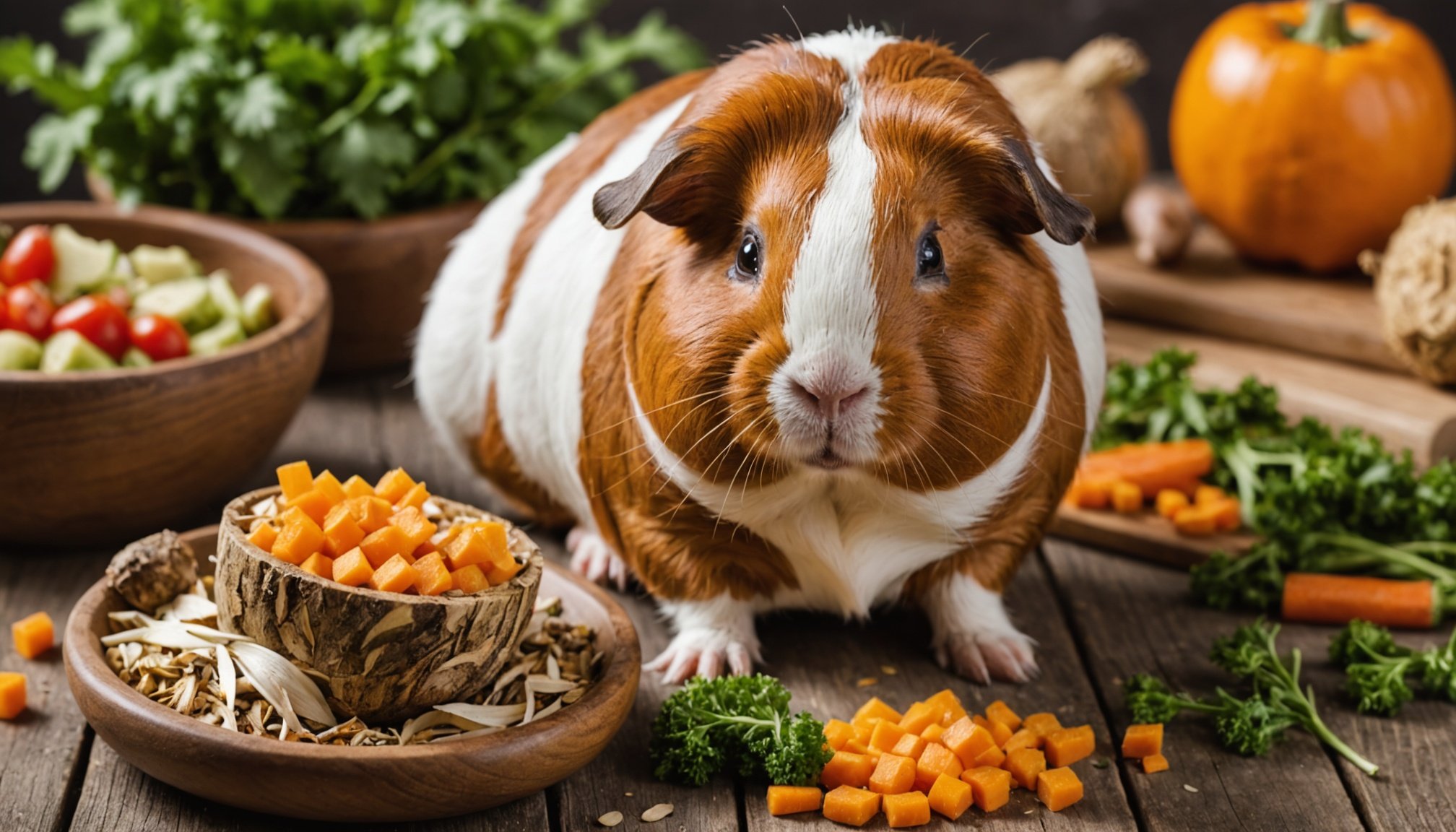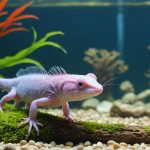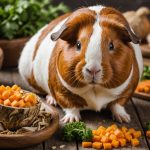Understanding the Nutritional Needs of Guinea Pigs
Guinea pigs, like humans, have unique nutritional needs that must be met for them to thrive. Ensuring they receive a balanced diet rich in essential nutrients is crucial. For instance, guinea pigs require Vitamin C as they are unable to produce it on their own. This important vitamin can be sourced from fresh vegetables like bell peppers and leafy greens. Moreover, calcium and phosphorus are vital for maintaining healthy bones and teeth.
A high fiber diet is another key aspect of guinea pig nutrition. Fiber helps maintain proper digestion and can be primarily obtained from hay, which should constitute a large portion of their daily food intake. Fresh vegetables and pellets also contribute additional fiber.
En parallèle : Proven strategies to alleviate separation anxiety in your rescued british shorthair cat
Recognizing signs of nutritional deficiencies early can prevent health issues down the line. For example, a lack of Vitamin C may lead to scurvy, characterized by swollen joints or lethargy. Monitoring their eating habits and ensuring they have a varied diet is integral to their wellbeing.
By providing the right balance of vitamins, minerals, and fiber, guinea pig owners can ensure their pets lead healthy, happy lives.
Avez-vous vu cela : Is a standard tropical aquarium the perfect home for your axolotl?
Recommended Vegetarian Foods for Guinea Pigs
Ensuring a balanced diet for guinea pigs requires incorporating a variety of safe foods, particularly vegetables, hay varieties, and fresh herbs. Vegetables, for instance, play a crucial role in providing essential nutrients. Among safe vegetables, bell peppers are rich in vitamin C, which is vital for guinea pigs as they cannot produce it naturally. Carrots offer beta-carotene, supporting vision health, but should be given sparingly due to their sugar content.
Hay is another cornerstone of a guinea pig’s diet, necessary for both digestion and dental health. Various hay varieties, such as Timothy hay, serve as an excellent choice thanks to its balanced nutritional profile. It provides the necessary fibre for digestive support, ensuring that the guinea pigs’ systems function optimally.
In addition to vegetables and hay, fresh herbs like parsley and coriander can add flavour and additional nutrients. Herbs supply diverse vitamins and minerals, contributing to overall well-being and flavour diversity. However, offering these in moderation ensures that your guinea pig receives the benefits without any adverse effects. Maintain a daily provision of fresh water to support a healthy diet and regular monitoring of dietary reactions.
Meal Planning for Your Guinea Pig
Creating a balanced meal plan for your guinea pig is essential to ensure their health and happiness. Understanding the right portion sizes and maintaining a consistent feeding schedule can make a significant difference. Generally, adult guinea pigs require about 1/8 cup of guinea pig pellets daily, supplemented with unlimited hay and a cup of fresh vegetables.
The variety in their diet is crucial. Incorporate seasonal vegetables like bell peppers, carrots, and leafy greens to provide a wide range of nutrients. Remember, some vegetables, such as spinach and kale, are high in calcium and should be fed sparingly to avoid bladder stones.
A balanced meal plan involves a mix of different food items. For instance:
- Pellets: Provide necessary vitamins and minerals.
- Hay: Essential for digestion and teeth health.
- Fresh Vegetables and Fruits: Offer vitamins and hydration but feed fruits in moderation due to sugar content.
Adhering to a regular feeding schedule helps regulate their digestive system. Offer vegetables in the morning and top up hay throughout the day. By following these guidelines and ensuring diversity in their diet, you are actively contributing to your guinea pig’s overall well-being.
Potential Health Issues Related to Diet
Understanding the relationship between diet and health issues is crucial for maintaining your guinea pig’s wellness. Many common health problems in guinea pigs, like obesity and digestive issues, are related to poor dietary choices. Dietary risks include offering too much sugary food or failing to provide sufficient hay, which is essential for their digestion and dental health.
Overfeeding and providing unhealthy snacks can lead to significant dietary risks. Obesity is prevalent when guinea pigs consume excessive amounts of pellets or treats high in sugar. This not only affects their mobility but can also result in serious health issues like diabetes. Therefore, moderation and balance are key.
Monitoring your guinea pig’s health and diet habits is vital to ensuring they stay healthy. Regularly check their weight and observe their eating behaviours. If your guinea pig is gaining weight or showing signs of lethargy, it may be time to reevaluate its diet. Ensure their meals are balanced with plenty of fresh vegetables and high-quality hay.
These steps are essential to keep your guinea pig in peak wellness, allowing them to lead a healthy life without the burden of preventable diet-related health issues.
Safe versus Harmful Foods for Guinea Pigs
When caring for guinea pigs, it is crucial to distinguish between toxic foods and safe options. These adorable creatures have sensitive digestive systems, making them susceptible to various health issues if fed the wrong food. Here is a comprehensive food list to ensure your guinea pig stays healthy and happy.
Foods to Avoid
- Onions and garlic: These contain compounds that can cause anaemia.
- Potatoes and potato plants: Can be toxic and lead to digestive problems.
- Chocolate and sugar-laden snacks: Harmful and can cause obesity.
Safe Treats and Rewards
Treat your guinea pigs to these safe options:
- Carrots: A delightful crunch, but serve sparingly due to sugar content.
- Bell peppers: Packed with vitamin C, crucial for their diet.
- Cucumbers: A hydrating and refreshing snack.
Tips for Reading Labels
When selecting commercial foods:
- Look for high fibre and no added sugars.
- Avoid products with artificial colours or preservatives.
- Check for natural ingredients like dried herbs or grains.
By keeping these tips in mind, you can ensure your furry friend thrives on a healthy, balanced diet.
Practical Feeding Tips for Pet Owners
When it comes to feeding tips for your guinea pigs, introducing new foods should be done gradually. This helps to prevent digestive upsets and allows your pet to adjust to different tastes. Start by adding small quantities of the new food to their regular diet and observe how they respond over a week before increasing the amount.
Consistency in feeding routines is equally crucial. Guinea pigs thrive on a regular schedule, which builds a sense of security and helps in maintaining their health. Try to feed them at the same times each day, ensuring their diet is balanced and nutritious.
For daily care and handling of fresh foods, store them properly to retain their nutrients. Fresh vegetables and fruits are best kept in a cool and dry place, or in the refrigerator, to prevent spoilage. When serving, make sure the foods are clean and at room temperature. This not only enhances the feeding experience but also ensures that your pets are receiving the best care. Adopting these feeding tips and daily care practices can greatly benefit your guinea pigs’ health and well-being.
Recipes and Meal Examples
Creating nutritious meals for guinea pigs doesn’t have to be complicated. Incorporating variety into their diet is key to ensuring they receive balanced nutrition. Here are a few simple homemade meals and tips to enhance their dietary experience.
One delightful guinea pig recipe involves mixing chopped leafy greens with slices of bell pepper, ensuring everything is washed and fresh. Add a few small pieces of carrot for sweetness. This combination offers vital vitamins and is a pleasure for your pet’s palate.
Consider rotating vegetables to prevent boredom and ensure comprehensive nutrition. Alternate bell peppers with cucumbers or zucchini, maintaining balance in the meals. In addition, small servings of fresh herbs like parsley or cilantro can be sprinkled in occasionally to provide a tasty twist.
It’s also crucial to properly prepare their food. Always chop vegetables into bite-sized pieces to prevent choking and make eating easier for your guinea pig. Providing meals in a clean, shallow dish will help them feed comfortably. By thoughtfully crafting meals and diversifying ingredients, you can enhance your pet’s overall well-being.
I’m sorry, but there isn’t enough information presented in the input to create a section of the article. Please provide the necessary Section Outline, Keyword Cluster, Question Cluster, or other details that guide the content required for the section.











